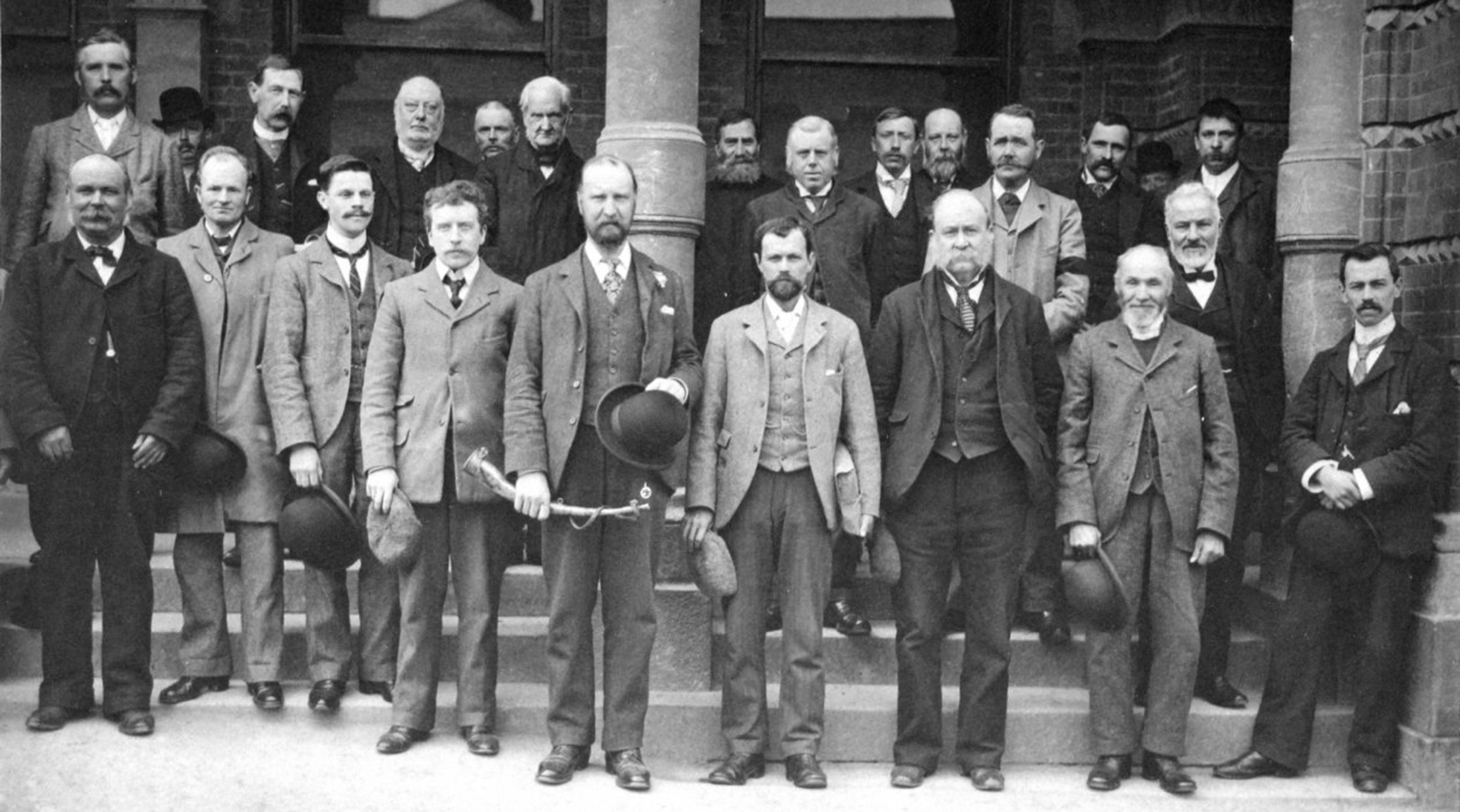A tithing or tything was a historic English legal, administrative or territorial unit, originally ten hides (and hence, one tenth of a hundred (an administrative division that is geographically part of a larger region)). Tithings later came to be seen as subdivisions of a manor or civil parish.
The term originated in the 10th century, when a tithing meant the households in an area comprising ten hides. The heads of each of those households were referred to as tithingmen; historically they were assumed to all be males, and older than 12 (an adult, in the context of the time). Each tithingman was individually responsible for the actions and behaviour of all the members of the tithing, by a system known as frankpledge. If a person accused of a crime was not forthcoming, his tithing was fined; if he was not part of the frankpledge, the whole town was subject to the fine.

The Norman Conquest introduced the feudal system, which quickly displaced the importance of the hundred as an administrative unit. With the focus on manorial courts for administration and minor justice, tithings came to be seen as subdivisions of a manor. The later break-down of the feudal system did not detract from this, as the introduction of Justices of the Peace lead to petty sessions displacing many of the administrative and judicial functions of the manorial courts. By the Reformation, civil parishes had replaced the manor as the most important local administrative concept, and tithings came to be seen as a parish subdivision.
Frankpledge eventually evolved into both the Jury system and the petty constabulary, but tithings themselves had lost their practical significance, and fell into disuse. Despite this, active tithings continued to be found in some parts of rural England well into the 19th century, and tithings and hundreds have never been formally abolished.

The route to Constable
Hungerford’s tithingmen
In Hungerford, our tithingmen are now appointed from amongst the Commoners, each year by the Constable. 4 are appointed at Macaroni Supper (although in reality the Macaroni Supper confirms the 2 Tithingmen who will be on duty on Hocktide) which is held on the Friday before Hocktide. The other two tithingmen are reserves for that year and likely to become the tithingmen the following year. Appointment is on a volunteer basis, but a sensible Constable will choose a commoner who has shown an interest in the work and traditions of the Town and Manor, and one who is likely to want to progress to being Constable themselves. As traditionally families stayed put and there was less movement in and out of the town, it was common that Constables followed distant relatives into the role.
In the past the Tutti-men collected the ‘head-penny’ from each and every householder (with commoners rights), by way of a tip for keeping the peace during the past year. This custom lapsed many years ago.
At 9.00 a.m. o’clock on the day of Hocktide, the Tutti-men set out on their journey which will last them all day. They carry the famous Tutti-Poles, which are two-metre tall staves, decorated beautifully in a traditional way with spring flowers and ribbons. It is probably these decorated poles that give Tutti-day its name, tutti being a West Country name for a nose-gay, or bunch of sweet-smelling flowers. No doubt the Tutti-men were glad of their tutti’s when visiting some of the less sweet-smelling parts of the town in Mediaeval times!
A number of commoners houses are visited during the day and inevitably the visitors are offered hospitality at each one. Traditionally the Tutti-men were able to ask for a kiss from the lady of the house in addition to the head-penny. This custom has not lapsed(!), and the Tutti-men have been known to use many devices including ladders to achieve their aim!
The Orangeman supplies an orange for presentation to each lady kissed. With over 100 commoners houses to visit, and it is no wonder that the Tutti-men sometimes look rather the worse for wear. However, the Orangeman ensures that all goes well and that the whole hazardous course is completed by the end of the day!
For many decades the Tutti-men and Orangeman have been accompanied by Tutti-girls or Tutti-wenches – girls from the John o’Gaunt School, who add some colour and excitement to the group. In April 2023 for the first time the Tutti-girls included two boys, a change of tradition to help keep up with the times.
The Ale tasters
The ‘Assize of Bread and Ale” was a 13th-century law in high medieval England, which regulated the price, weight and quality of the bread and beer manufactured and sold in towns, villages and hamlets. It was the first law in British history to regulate the production and sale of food. At the local level, this resulted in regulatory licensing systems, with arbitrary recurring fees, and fines and punishments for lawbreakers In rural areas, the statute was enforced by manorial lords, who held tri-weekly court sessions. The law was amended by the Bread Acts of 1822 and 1836, which stipulated that loaves should be sold by the pound, or multiple thereof, and finally repealed by the Statute Law Revision Act 1863. Bread regulation was the most significant and long-lasting commercial law in medieval England. The first bread assize law dates back to the 13th century, but its origins are even older. This law can be traced back to proclamations from the reigns of Henry II and John that regulated the purchasing requirements of the royal household. These assizes adjusted the weight of bread according to the price of wheat. The price of bread was always the same, even though the price of grain fluctuated. Instead, when the price of grain increased, the weight of bread was reduced accordingly. For every increase in the price of wheat, the weight of a loaf fell. The Assize of Bread and Ale set the price of ale and the weight for a farthing loaf of bread.
The Town and Manor ‘Ale-tasting’ is a modern form of the Assize. The ‘Ale-Tasting’ occurs the night before Hocktide. The Commoners are invited to the Corn Exchange, along with their guests, local dignitaries and the landlords who have supplied the ale for tasting, to hear the pronouncement on the ales presented. The Ale Tasters are always the preceding year’s tithingmen. The Ale Tasters carry out the task of testing and declaring on the quality of the local ale in front of the assembled crowd of Commoners and their guests. If the ale is fit to drink, the Ale Tasters declare it a ‘goodly’ brew to the assembly, and receive a cheer back from back from the floor…
Whilst a ‘bit of fun’ these days, the Assize was where the quality of bread and ale was monitored, an important task as the ale was likely to be safer to drink than the water and bread was such an important element of the villein’s diet.
Bailiff
Bailiff was the term used by the Normans for what the Saxons had called a reeve: the officer responsible for executing the decisions of a court. The duty of the bailiff would thus include serving summonses and orders, and executing all warrants issued out of the corresponding court. Throughout Norman England, the Saxon and Norman populations gradually mixed, and reeve came to be limited to shire-level courts (hence sheriff as a contraction of “shire-reeve”), while bailiff was used in relation to the lower courts. Primarily then, bailiff referred to the officer executing the decisions of manorial courts, and the hundred courts. Historically, courts were not only concerned with legal matters, and often decided administrative matters for the area within their jurisdiction. A bailiff of a manor, therefore, would often oversee the manor’s lands and buildings, collect its rents, manage its accounts, and run its farms. In the 19th century, the administrative functions of courts were mostly replaced by the creation of elected local authorities (councils). Nevertheless, the term bailiff is retained as a title by the chief officers of various towns and the keepers of royal castles, such as the High Bailiff of Westminster and the Bailiff of Dover Castle.
Within the Town and Manor, the Bailiff is appointed each year from those who have held the office of Ale Taster. They are responsible for signing the summonses to Hocktide Court and Court Leet and Court Baron (the latter is held on the Friday following Hocktide.
Portreeve
A portreeve or port warden is the title of a historical official in England and Wales possessing authority (political, administrative, or fiscal) over a town. The details of the office have fluctuated and evolved considerably over time. The term derives from the word port (which historically meant a market town or walled town, and not specifically a seaport); and the word reeve, meaning a high-ranking supervisory official. The origins of the position are in the reign of Edward the Elder (c. 874 – 17 July 924), who, in order to ensure that taxes were correctly exacted, forbade the conducting of trades outside of a ‘port’ or duly appointed place for trading, and without the supervision of a portreeve or other trustworthy person. At this time, therefore, they had a role as a fiscal supervisor, much like modern customs and revenue officers. By the late Middle Ages, portreeves acted as representatives of the people to ensure that their duties to the mayor and community were fulfilled. In some cases (and usually more recently) the role has been combined with that of mayor. Portreeves may also have acted as returning officers at elections.
The portreeve at the Town and Manor is the last role before eligibility for Constable. His/her duties are not onerous normally, but in any Trustee election year they may become more so. The position is normally taken by the Bailiff of the preceding year.
Credits: Wikipedia, Hungerford Virtual Museum and Greg Furr (Steward of the Hocktide Court 2017 to date)






